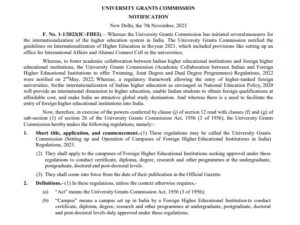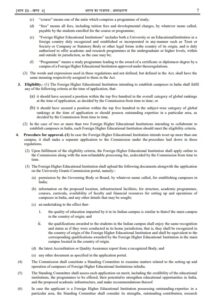The News Freedom
Chandigarh, November 8
In a significant move to internationalising higher education in India, the University Grants Commission (UGC) has notified the regulations that grant foreign universities complete autonomy in determining their admission procedures, fee structures, and faculty appointments for campuses in the country. The notification regarding regulations announced on Wednesday aims to foster global collaboration and enhance the quality of education in India, the UGC said.
Regarding the eligibility criteria for foreign higher educational institutions seeking to establish campuses in India, the UGC regulations said that these institutions must have secured a position within the top five hundred in global rankings in the overall category at the time of filing application, as determined by the UGC. Furthermore, they must have secured a similar position in subject-wise global rankings or possess exceptional expertise in specific academic areas, subject to periodic UGC assessments.
Sharing details about the admission processes and fee structures, the UGC notification said that the campuses of foreign higher educational institutions are granted the flexibility to evolve their admission criteria for both domestic and international students. Additionally, these institutions are entrusted with the authority to determine transparent and reasonable fee structures. Transparency is key, and these institutions must make their prospectus available on their website at least sixty days before the commencement of admissions, including comprehensive details about fee structures, refund policies, the number of seats available in each program, eligibility qualifications, and admission processes.

The UGC notification also introduces scholarship opportunities. Discussing about the scholarships, the UGC notification said that based on an evaluation process, the Foreign Higher Educational Institution may provide full or partial merit-based or need-based scholarships from funds such as endowment funds, alumni donations, tuition revenues and other sources. “The foreign higher educational institutions may give tuition fee concessions to students who are Indian citizens.” the UGC further said.
Regarding recruitment of the faculty and staff, the UGC has granted foreign higher educational institutions the authority to recruit faculty and staff from both India and abroad in accordance with their recruitment norms. The UGC said that these institutions are given the liberty to determine qualifications, salary structures, and other conditions of service for their faculty and staff.However, it is crucial to ensure that the qualifications of appointed faculty are at par with the main campus in the institution’s country of origin. In a bid to foster international collaboration, the UGC specifies that international faculty members appointed to teach at Indian campuses must stay in India for at least one semester, enhancing the academic exchange.
In cases where two or more foreign higher educational institutions seek to collaborate and establish campuses in India, the UGC notification further said that each institution is mandated to meet the specified eligibility criteria and submit separate applications to the UGC. Following the fulfillment of these criteria, the institutions are required to apply online to the UGC, accompanied by a non-refundable processing fee, as determined by the UGC.
With a focus on general conditions, the UGC emphasises that Foreign Higher Educational Institutions may not admit students or collect fees without proper approval under these regulations to set up their campuses in India. To ensure the consistency of education, these institutions must guarantee that the curriculum, pedagogy, assessment, and other facets are delivered in a manner similar to their main campus in their country of origin. Programs offered exclusively online or through open and distance learning modes are not permitted, except for a limited allowance of online lectures, not exceeding ten percent of the program’s requirements, as stated by the UGC.
The UGC notification also stipulates that foreign higher educational institutions must seek prior approval from the Commission before initiating any new programs through the University Grants Commission portal. Qualifications offered in the Indian campuses of Foreign Higher Educational Institutions under these regulations will be awarded under the name and seal of the institution in its country of origin.
Crucially, the qualifications conferred upon students in Indian campuses will enjoy the same recognition and status as if they were obtained in the institution’s home jurisdiction. This recognition extends to being equivalent to the corresponding qualifications awarded by the institution’s main campus in its country of origin, as outlined by the UGC. The new regulations are poised to revolutionize the landscape of higher education in India and foster greater collaboration between international and domestic institutions.

